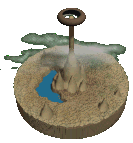 Notes
Notes

Yogi's Comments: Couple things I like here, some I don't. Let's itemize:
1) A DM should be free to add effects or damage that may or may not be spelled out in the rules if it adds to the story, especially if it helps realism. In this example, a character took a hard crack, and as I have not idea where rules about unconciousness can be found, I can see him making that call, maybe going with a set percentage guessed at for the situation, and rolling. If you let your own common sense guide you, you shouldn't be far off. However, be willing to discuss this after the game with your players. They may have a good idea for a rule that you can pull from. Always work with your players, because no matter how much you know, you can always learn more from others.
2) I hate seeing something as the "annoying player syndrome".
That is, doing something to character to teach the player a lesson. At
most, this should be used very rarely used, but overall, let the character
suffer the effects of their decisions. If they talk in character as most
power gamers do at the table, the constant problems make their attempts
to do what they want fail. No one likes being hated, and when their heroic
character is openly hated by NPC's, usually they need to think twice.
**I may have to eat my words here, as I'm about to run a small campaign
to teach a player something. I'm trying to break a ahabid he has of game
lawyering. I'll keep you posted on how well it is going.**
3) In situations, always give the players a choice. The wording
of this choice can allow many things though. Often, making clear to a player
the effects their character could have on the world around them (often
reminding them of the laws of physics is needed to) often makes the decision
for them. But when they incist on being "stupid" from your perspective
(and PC's always will, as they are PC's :), always give them a chance of
suggest (even if that is a 2% chance), and let the player know the odds
of success. If they want to do, let them. Try to adjust for them in the
plot, and augment you plans. If they do succeed, be as prepared as possible
to deal with it. Remember, their supposed to be heroes, and therefore succeeding
in things that should never work (See Star Wars Trilogy) fits them. But
they also will fail. You need to make your players realize this. If you
don't get the characters a chance to do what they want, you will find yourself
soon with an empty table, and that helps no-one.

For instance, I'll take an example from my oldest campaign: Planescrape. I was running the adventure "Recruiters" from the Well of the Worlds, where the city bordering the plane of the Abyss is about to be swallowed by the Abyss because the philosophies in both places were the same. The heroes were supposed to help unite everyone and make people think more lawfully and good to keep the city from being swallowed. However, this is not what the players decided to do. They helped add to the chaos in a vain hope that they could escape (so they only we looking out for themselves). I didn't expect this, so I followed through from their actions: the city WAS swallowed by the Abyss. This turned into about 4 adventures where only three of the PC's from the group survived, but it was wonderful for plot and really added to the campaign. Also rememberr that some effects are not so obvious. Just remember these three things to bring consequences into reality: 1) Everything that is killed has a family, 2) Enemies can change tactics based on previous encounters, and 3) NPC's are dynamic, not static characters.

6. Don't forget to remind them how insignificant they are on a regular basis. There's nothing worse than cocky planewalkers. ;)
7. Background! Consider character information sheets - a list of details of things they know or have heard about - about a third useful, a third vaguely useful in the future, and a third red herrings - like "berk" is a sign of respect, etc. And of course, try to get them to come up with a background.
8. Avoid getting bogged down, unless you want to. For example, starting in The Outlands, Sigil or Pelion can be fun, but if the characters get complacent they may avoid leaving. Big yawn. Also decide if you want to run a single plane campaign, two-plane campaign or multiple plan campaign. Check the Planewalkers Handbook for ideas on how to do this effectively.
9. Don't fall into the trap of thinking they're incapable of going certain planes at certain levels. A low level party can go anywhere if they're prepared and know what to do. Although The Abyss should always be unforgiving.
10. Bariaur! You need more! Baaaaaa!Responses coming when I have to OK from Gary to do so.

The Big List of RPG Plots - http://www.io.com/~sjohn/plots.htm
This page has tons of great adventure ideas, with twists,
so you players still won't know what to do when you reuse the same basic
ideas.
Random Encounters - http://web.cs.ualberta.ca/%7Ewade/HyperDnd/Encounters/
This page has many small adventures to help fill out
a world. They are kinda cool, and there are definately a few gems
in there. Worth scanning to add as a small sidetrek.
Random Hook Generator - http://www.lifeformz.com/idea/idea.cgi
This is a bit silly and often a waste of time, but it
is a random adventure source idea. Most of the time, it is just silly
and pointless, but I've pulled a gem or two out of it, so you might want
to look.

